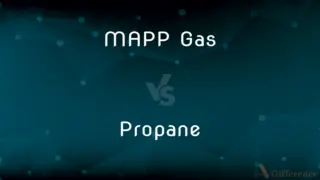Must vs. Shall — What's the Difference?
By Tayyaba Rehman — Updated on October 31, 2023
"Must" implies a necessity or requirement, often used for strong obligation or inevitability. "Shall" is more formal, traditionally used to express future action or a strong intention.

Difference Between Must and Shall
Table of Contents
ADVERTISEMENT
Key Differences
"Must" conveys a sense of obligation, necessity, or compulsion. "Shall" is used for a determined or emphatic future action, especially in formal or legal contexts.
"Must" often indicates a requirement or something that is unavoidable. "Shall" is used to express a strong intention or promise.
In modern usage, "must" is more common and versatile, applicable in various contexts. "Shall" has become more formal and less frequent, often replaced by "will".
"Must" can also express a logical deduction or conclusion. "Shall", in contrast, is more about instruction or determination.
"Must" can suggest personal obligation or internal compulsion. "Shall" is often used in rules, regulations, or formal agreements.
ADVERTISEMENT
Comparison Chart
Usage Context
Obligation, necessity.
Formal future action.
Connotation
Compulsion, requirement.
Determination, intention.
Commonness
More common and versatile.
More formal, less frequent.
Application
Personal obligation, logical conclusion.
Rules, formal agreements.
Implied Force
Stronger sense of necessity.
Formal instruction or promise.
Compare with Definitions
Must
Used for something unavoidable.
The meeting must happen today.
Shall
Used to indicate future action.
We shall meet again soon.
Must
Indicates obligation or necessity.
You must wear a helmet when cycling.
Shall
Indicates a strong promise.
You shall receive your order tomorrow.
Must
Expresses a strong recommendation.
You must try this new restaurant.
Shall
Used in formal questions or offers.
Shall we dance?
Must
Implies an internal compulsion.
I must finish this book tonight.
Shall
Used in legal or formal contexts.
The tenant shall pay the rent monthly.
Must
Must (from the Latin vinum mustum, "young wine") is freshly crushed fruit juice (usually grape juice) that contains the skins, seeds, and stems of the fruit. The solid portion of the must is called pomace and typically makes up 7–23% of the total weight of the must.
Shall
Expresses a formal intention.
I shall complete the report by Friday.
Must
To be obliged or required by morality, law, or custom
Citizens must register in order to vote.
Shall
Used before a verb to indicate the simple future tense in the first person singular or plural.
I shall sing in the choir tomorrow.
I hope that we shall win the game.
Must
To be compelled, as by a physical necessity or requirement
Plants must have oxygen in order to live.
Shall
Used similarly to indicate determination or obligation in the second and third persons singular or plural.
(determination): You shall go to the ball!
(obligation): Citizens shall provide proof of identity.
Must
Used to express a command or admonition
You must not go there alone. You simply must be careful.
Shall
Used in questions with the first person singular or plural to suggest a possible future action.
Shall I help you with that?
Shall we go out later?
Let us examine that, shall we?
Must
To be determined to; have as a fixed resolve
If you must leave, do it quietly.
Shall
(obsolete) To owe.
Must
Used to indicate inevitability or certainty
We all must die.
Shall
To owe; to be under obligation for.
Must
Used to indicate logical probability or presumptive certainty
If the lights were on, they must have been at home.
Shall
To be obliged; must.
Must
To be required or obliged to go
"I must from hence" (Shakespeare).
Must
Something that is absolutely required or indispensable
Promptness on the job is a must. Comfortable boots are a must when going on a hike.
Must
The quality or condition of being stale or musty.
Must
The unfermented or fermenting juice expressed from fruit, especially grapes.
Must
Variant of musth.
Must
Musk.
Must
To do with certainty; indicates that the speaker is certain that the subject will have executed the predicate.
If it has rained all day, it must be very wet outside.
You picked one of two, and it wasn't the first: it must have been the second.
Must
To do as a requirement; indicates that the sentence subject is required as an imperative or directive to execute the sentence predicate, with failure to do so resulting in a failure or negative consequence.
Must
Used to indicate that something that is very likely, probable, or certain to be true.
The children must be asleep by now.
Must
(transitive) To make musty.
Must
(intransitive) To become musty.
Must
Something that is mandatory or required.
If you're trekking all day, a map is a must.
Must
The property of being stale or musty.
Must
Something that exhibits the property of being stale or musty.
Must
Fruit juice that will ferment or has fermented, usually from grapes.
Must
To be obliged; to be necessitated; - expressing either physical or moral necessity; as, a man must eat for nourishment; we must submit to the laws.
Must
To be morally required; to be necessary or essential to a certain quality, character, end, or result; as, he must reconsider the matter; he must have been insane.
Likewise must the deacons be grave.
Morover, he [a bishop] must have a good report of them which are without.
Must
The expressed juice of the grape, or other fruit, before fermentation.
No fermenting must fills . . . the deep vats.
Must
Mustiness.
Must
To make musty; to become musty.
Must
Being in a condition of dangerous frenzy, usually connected with sexual excitement; - said of adult male elephants which become so at irregular intervals, typicaly due to increased testosterone levels.
Must
A necessary or essential thing;
Seat belts are an absolute must
Must
Grape juice before or during fermentation
Must
The quality of smelling or tasting old or stale or mouldy
Must
Highly recommended;
A book that is must reading
Must
Shows a logical conclusion.
If the lights are on, someone must be home.
Common Curiosities
Is "must" always about obligation?
Primarily, but it can also suggest strong advice.
Can "shall" be used in casual conversation?
Rarely, it's more formal and often replaced by "will".
Does "must" indicate a higher necessity than "should"?
Yes, "must" implies stronger compulsion.
Is "shall" common in legal documents?
Yes, it's frequently used for formal obligations.
Can "must" imply certainty or logical deduction?
Yes, such as in "It must be raining outside."
Can "shall" imply a command?
In formal contexts, yes, it can imply an instruction.
Can "must" be used to express prohibition?
Not directly; "must not" is used for prohibition.
Is "shall" ever used in questions?
Yes, in formal offers or suggestions like "Shall we go?"
Is "shall" interchangeable with "will"?
Not always; "shall" is more formal and emphatic.
Does "must" have a past tense form?
No, it's used with have + past participle for past obligations.
Is "must" used for personal feelings of obligation?
Yes, it can reflect personal compulsion.
Is "shall" declining in usage?
Yes, especially in everyday spoken English.
Is "must" appropriate in formal writing?
Yes, especially for stating requirements or obligations.
Does "must" have a modal auxiliary verb form?
Yes, "must" is a modal verb.
Can "shall" indicate future actions in contracts?
Yes, it's common in specifying future obligations.
Share Your Discovery

Previous Comparison
Atomicity vs. Valency
Next Comparison
Cousin vs. NephewAuthor Spotlight
Written by
Tayyaba RehmanTayyaba Rehman is a distinguished writer, currently serving as a primary contributor to askdifference.com. As a researcher in semantics and etymology, Tayyaba's passion for the complexity of languages and their distinctions has found a perfect home on the platform. Tayyaba delves into the intricacies of language, distinguishing between commonly confused words and phrases, thereby providing clarity for readers worldwide.















































